Author: CMed, BlockBeats
Memecoin’s “Speculative” Era
Many people say that Solana in this cycle is the Ethereum in the previous cycle. A very important proof is that the wealth effect brought by Pump.fun in this cycle is exactly the same as the wealth effect brought by Ethereum's ICO in the previous cycle. We have seen many thousand-fold and ten-thousand-fold coins appear within a few days.
Everyone can issue their own Memecoin on Pump.fun, which undoubtedly attracts funds to the chain. There are a lot of Web3 existing funds that were once in CEX, and a lot of Web2 incremental funds. There is even Moonshot, a fiat currency trading platform that perfectly connects the last mile of Web2 and Web3 Memecoin.
Perhaps it is precisely because of this "get-rich-quick" effect and the extremely low threshold for token issuance that many people just "take a bite and run." Many people think that investing in Memecoin has become a speculative behavior of "passing the parcel," and many Memecoin players believe that the key to becoming a meme is to "run fast."
Such a wealth effect attracted many new on-chain users, and the market value of most Memecoins was inflated. Some "hard-found angles" could bring about FOMO in many people, quickly pushing up the market value. When the market value approached 20 million US dollars, they quickly took profits, causing a large number of early holders or project parties to stampede and leave the market, and then quickly returned to zero. Many Memecoins with "narrative angles" gradually returned to zero after a brief surge.
It is interesting that in Web3, a place where information is transmitted extremely fast in our traditional cognition, it takes a long time to reach consensus and realize value discovery. Many Memecoins that seem to have run out now have gone through this process. For example, GOAT quickly reached a market value of about 20 million US dollars after the token was issued, and then quickly fell back. It was at 10 million US dollars and experienced a long period of sideways trading before its value was discovered and continued to rise. Another example is Ban. After the token was issued, it quickly reached a market value of about 5 million US dollars, and then fell back by more than 80% in PVP and group FUD. It took more than 20 hours to gather group consensus and the market value was quickly pushed up. ACT and Pnut, which were "backstabbed by the project party", are also like this.
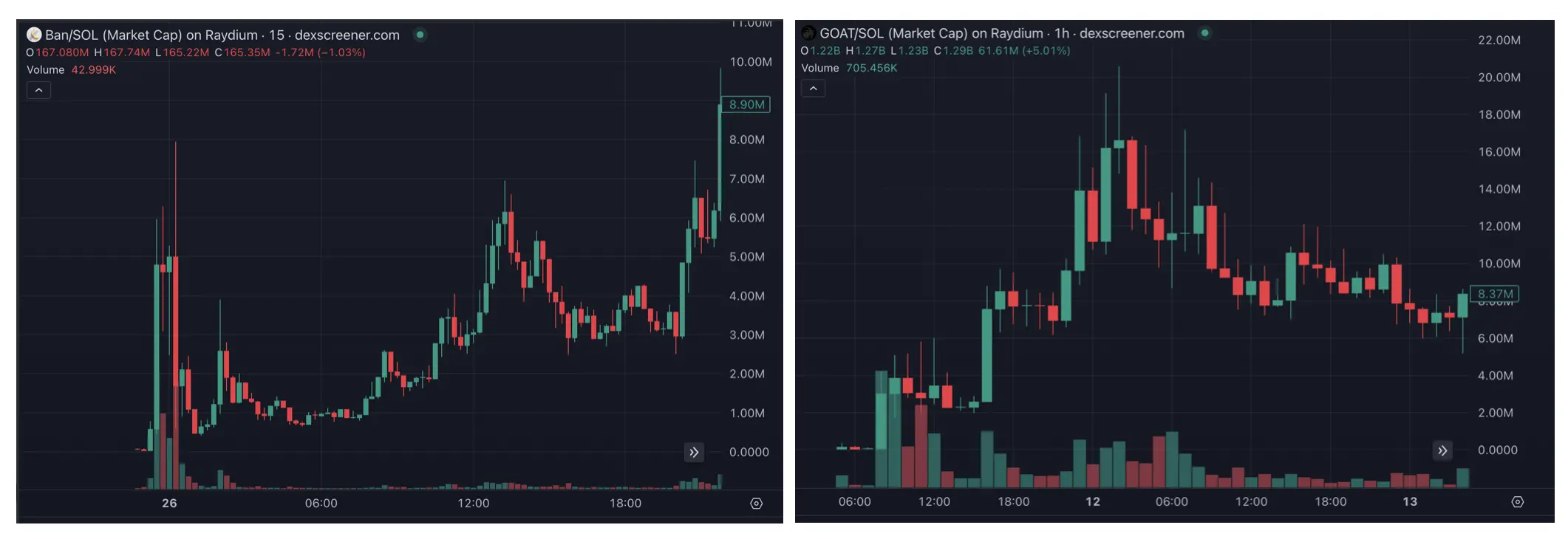
Why does such a Memecoin with a narrative angle take so long to discover its price? There is no doubt that this is strongly related to the PVP logic that has been deeply rooted in people’s minds. “Speculators” are afraid that the early chips will quickly return to zero after “dumping the market to make profits”, and they are still in the “PVP” logic.
All this has changed recently.
Memecoin
Trump's election as President of the United States ushered in the era of "cryptocurrency".
It not only means that mainstream cryptocurrencies represented by Bitcoin have been recognized by the market, but also that with the political endorsement of BTC ETF, more U.S. stock investors will invest in the cryptocurrency market. It also represents the relaxation of cryptocurrency regulation in the U.S. political arena. The possibility of DeFi tokens being regarded as "securities" and regulated is reduced, and Meme coins can enter the investment vision of American investors.
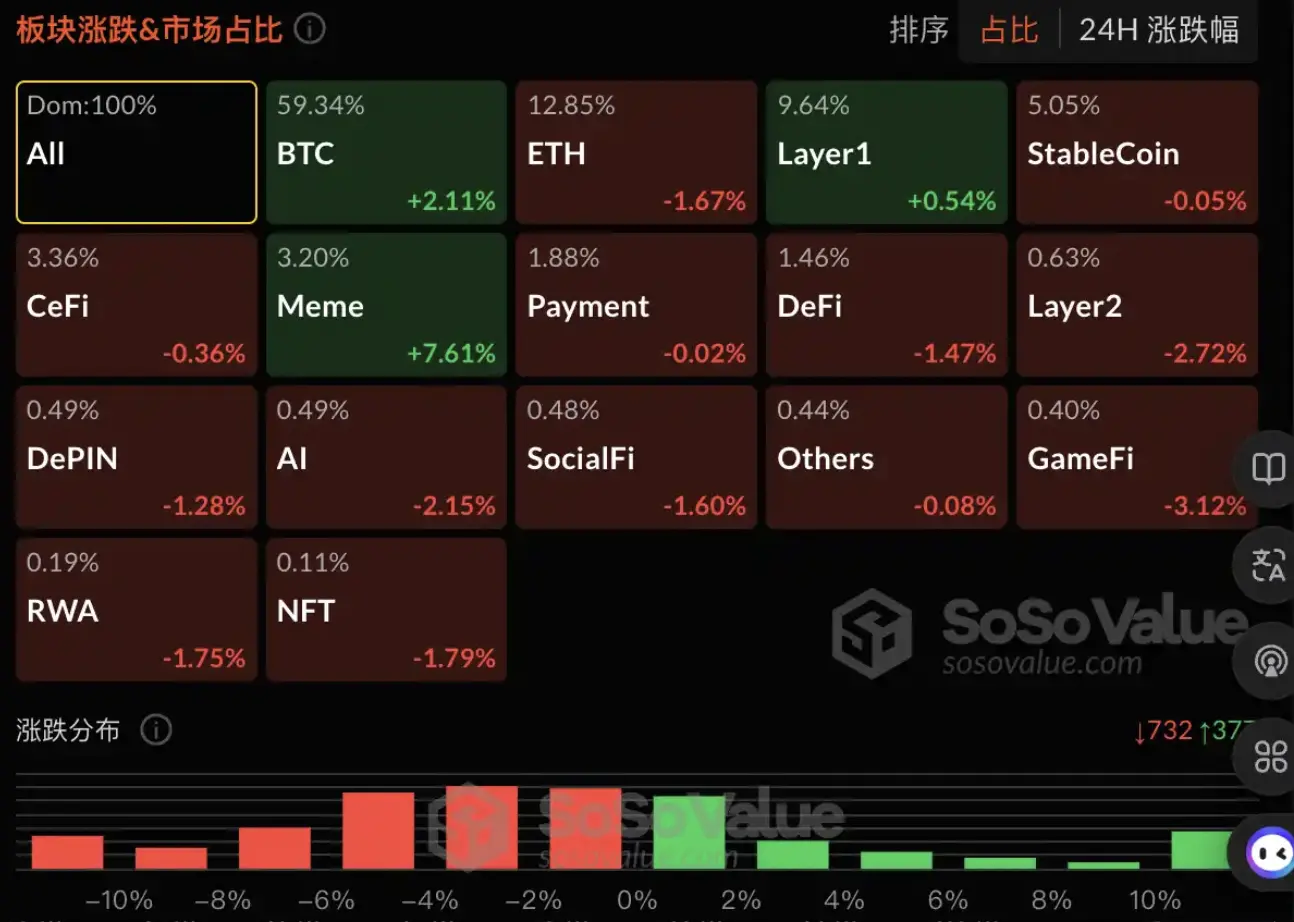
CoinBase included Pepe in its coin listing roadmap, Binance launched ACT and Pnut, and Elon Musk repeatedly supported the squirrel Peanut on social media and published a statement to establish a government efficiency department with the same name as Doge coin. The influence of Meme coin is rapidly expanding and being recognized. There is no doubt that Elon Musk is a staunch supporter of Meme coin, "America was saved by a squirrel and meme coin."
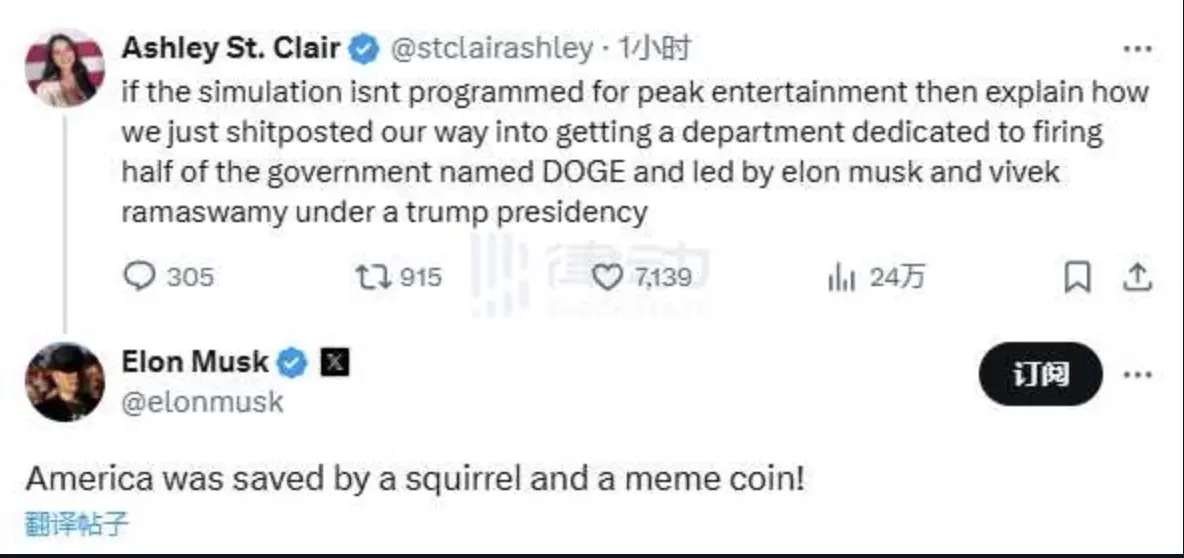
As Murad once said, "We are at the beginning of the Meme SuperCycle." The average market value of meme coins is also increasing. After CoinBase launched Pepe, Pepe's total market value once exceeded 10 billion US dollars. After Binance launched Pnut and ACT, Pnut's market value reached 2.5 billion US dollars at its highest. It has reached 1.8 billion US dollars at present. ACT's market value is close to 1 billion US dollars, Goat's market value is around 1 billion US dollars, and Doge's total market value ranks in the top 5. At present, the market recognition of meme coins has increased visibly.
On November 13, Moonshot said on its social platform that the platform's fiat currency inflows set a new record. "Non-crypto native users are pouring in."

Memecoin’s “Investment” Era
Binance is also working hard for the development of Meme coins. The original logic of CEX listing Meme coins may be mainly based on market value, supplemented by the so-called "Listing Fee". The listing of ACT and Pnut by Binance indicates a new beginning for CEX's support for Meme coins.
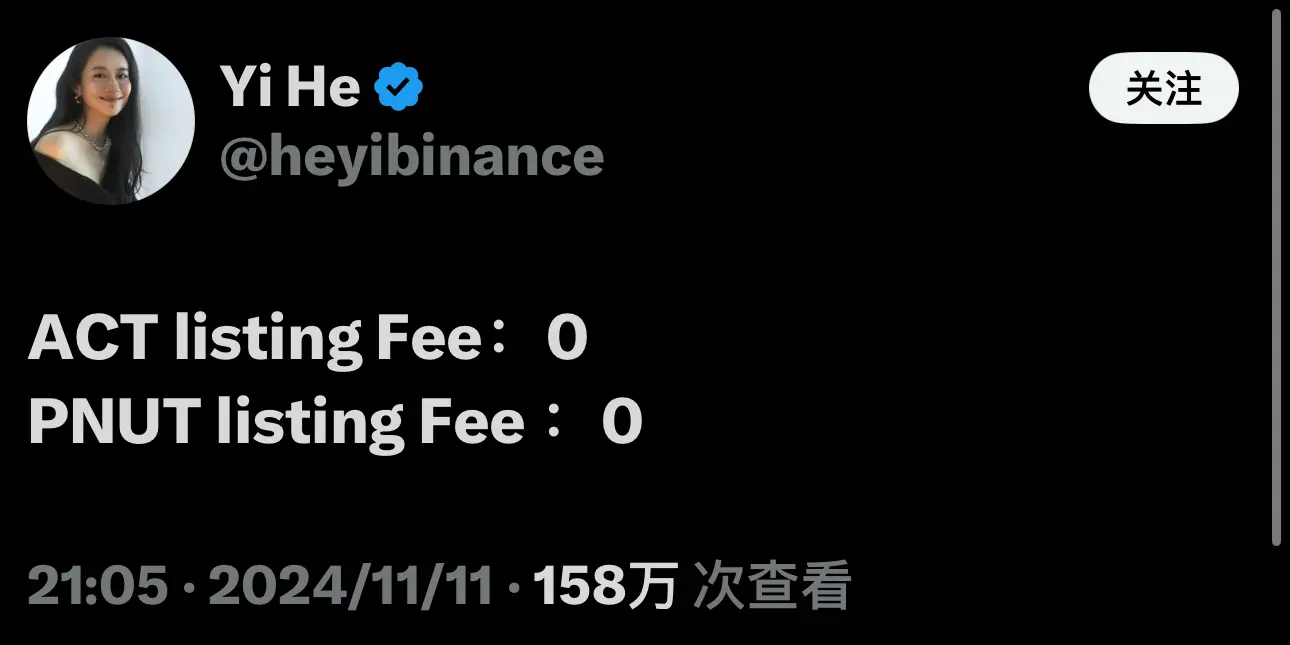
What is important about Meme coin is no longer its market value, but its community and perspective. After all, ACT, with a total market value of 20 million US dollars, can be listed on the top CEX, and it has produced a very prominent wealth effect after the announcement of the news. The current market value of ACT is 800 million US dollars, and individual investors can use information differential arbitrage more than 10 times in a purely manual way.
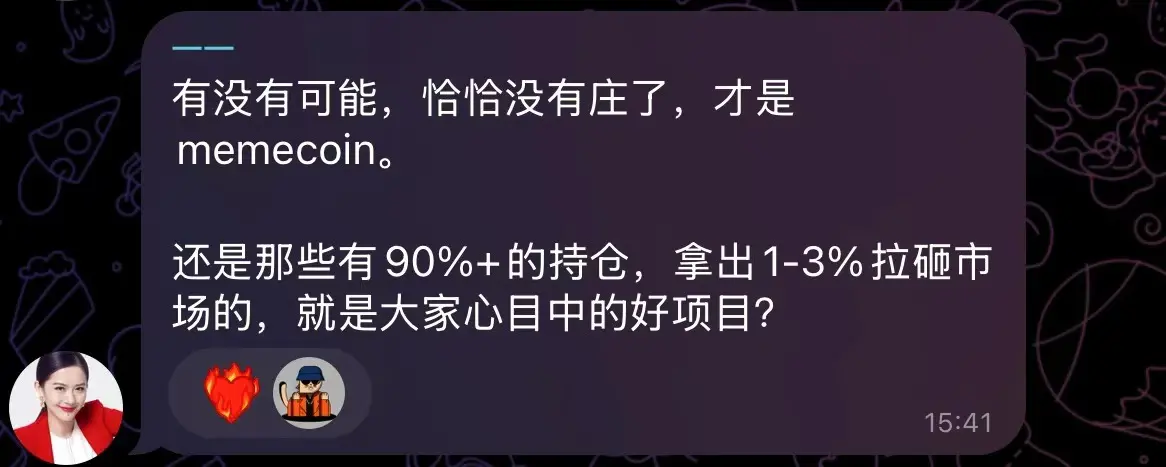
This wealth effect not only reflects Binance's recognition and support for the Memecoin industry, but also points the way for the Memecoin community. Communities with outstanding narratives and perspectives and excellent community culture are very likely to be listed on CEX. We can also see from the recent new projects on Binance that nearly half of the new projects are Memecoin. Memecoin culture can be spread through CEX channels and better developed.
For individual investors, the perspective of investing in meme has changed. It is no longer about internal PVP. Meme coins without angles and narratives are no longer popular. Some first-tier investors believe that this is more beneficial to the market. There is no need to "pan for gold in shit" and pile up a bunch of internal plates that cannot be launched at all, and consume the principal in PVP. Instead, they pay more attention to angles and narratives, and then build communities and promote projects to exchanges. This returns to the essence of memecoin, rather than making money by "rushing early and running fast."
The market's imagination of Memecoin has been opened up. The market value of nearly 20 million US dollars was quickly sold out, resulting in a stampede and a near-zero outcome. The dividing line for whether a coin is a "golden dog" in the market is 20 million US dollars, and many "half-golden dogs" fell before the 20M threshold.
Today, Pepe is preparing to be listed on CoinBase with a market value of over 10 billion US dollars, ACT is listed on Binance with a market value of over 500 million US dollars, GOAT has a strong AI meme narrative platform behind it with a market value of over 1 billion US dollars, and after Elon Musk frequently supported Pnut, Pnut's market value exceeded 1.5 billion US dollars. The market is full of expectations and longings for the "big golden dog" with a value of over 1 billion US dollars. The market gradually understands what Murad said, "The direction of the Memecoin super cycle is that 7-8 Memecoins will become a huge digital tribe worth more than 20 billion US dollars."
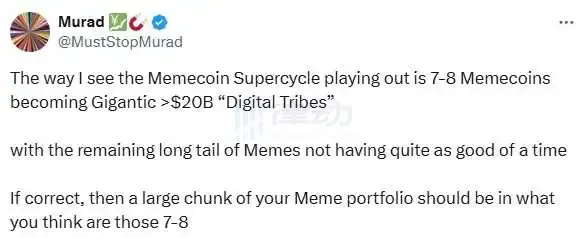
For DEV, which issues Memecoin, the pricing of Memecoin’s market value has been increased, there is less “cut and run”, more focus on community building, more focus on building the culture itself, and a more complete docking process with CEX.
This is also good news for individual investors. Investing in Meme is more like investing. Investigate the angle and community, find meme coins with potential in the early stage of the first level, wait for price discovery, and go on CEX to face more Web3 groups or Moonshot Web2 groups.
There are also many "diamond hands" voices in the market. The market's positioning of the market value of meme coins is set at billions or even tens of billions of US dollars. Many people say "Pnut is either 4B or zero, and I will never sell it in between!" The logic of PVP seems to have changed. The players who bought Pnut in the early stage have now made a floating profit of more than 210,000 times, and made a profit of more than 4 million US dollars at a cost of 0.1sol, but he still holds it firmly.
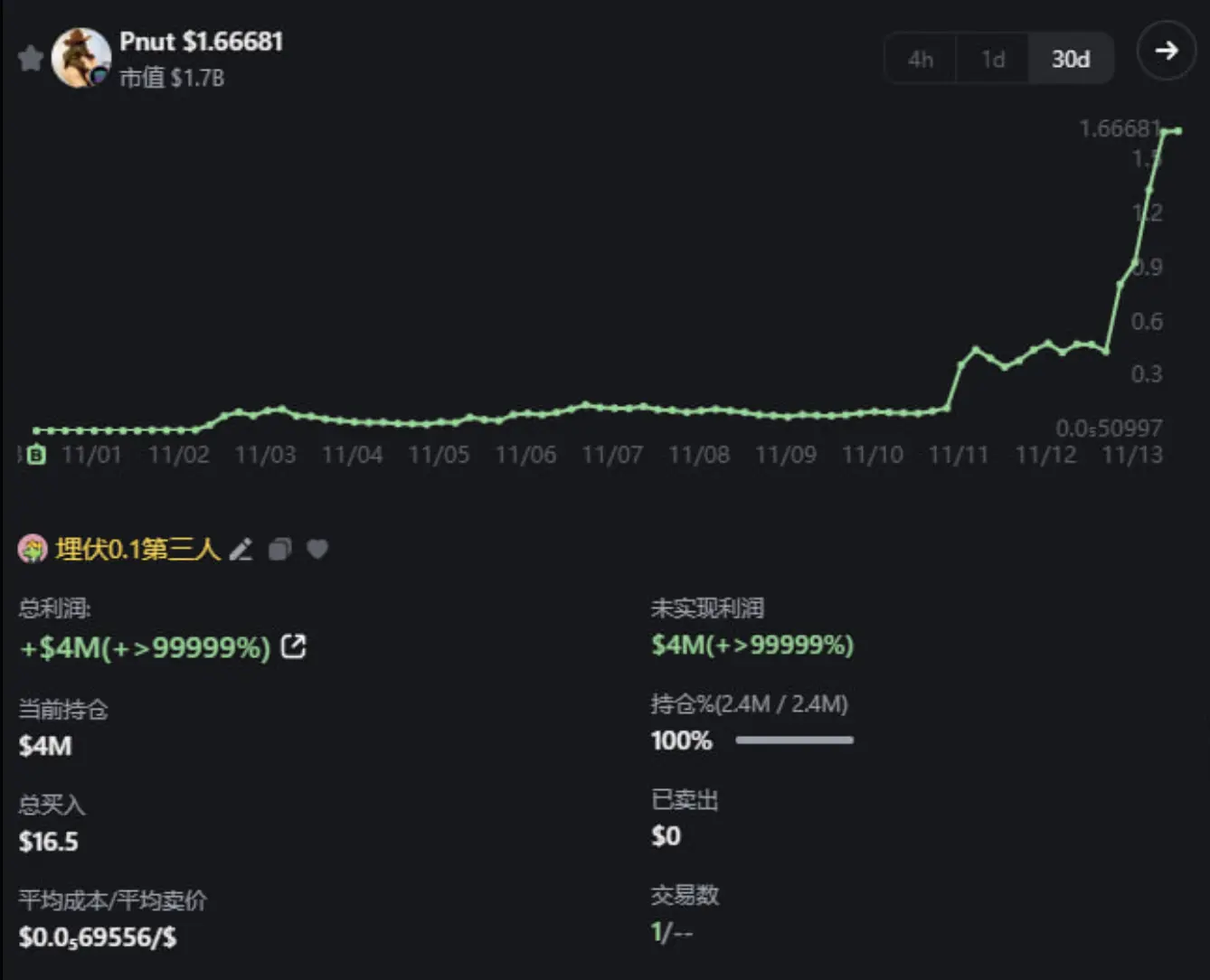
As of the time of writing, many “half-golden dogs” that once achieved success but ultimately did not fully succeed and saw their market value fall sharply have seen a significant increase in their market value.
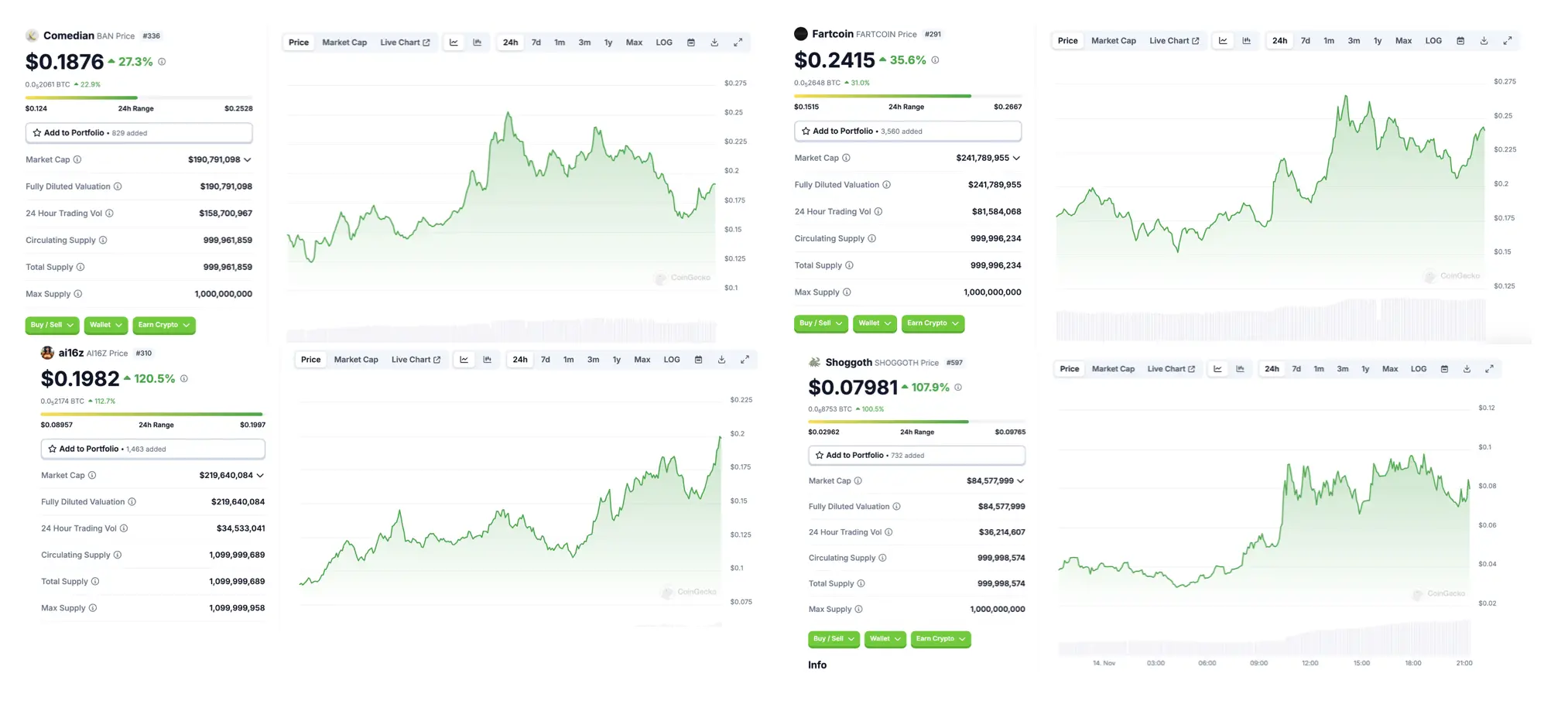
The value of many Memecoin projects that we once thought had "returned to zero" has been rediscovered. Their value may be discovered in the future in the expectation of "listed on CEX". Many memecoins that truly represent a community culture have been issued, returning to the most original cultural value of Memecoin. Behind them may be an AI agent robot, a new "Internet celebrity animal", or an eagle that needs to be released.
As Murad said, "Meme coins are a test. To view them as jokes and funny pictures is a failure. To understand that they are unstoppable tokenized communities is the real understanding." We have seen signs that the gears of the Meme SuperCycle are slowly turning, and Meme culture has stepped out of PVP and opened a new chapter.












